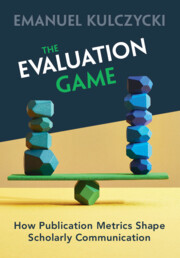Book contents
- The Evaluation Game
- The Evaluation Game
- Copyright page
- Contents
- Acknowledgments
- Introduction
- 1 Evaluation as Power
- 2 Economization and Metricization
- 3 Untold Histories of Research Evaluation
- 4 The Diversity of Evaluative Powers
- 5 Players and the Stakes
- 6 Playing the Evaluation Game
- Conclusions
- References
- Index
Introduction
Published online by Cambridge University Press: 21 April 2023
- The Evaluation Game
- The Evaluation Game
- Copyright page
- Contents
- Acknowledgments
- Introduction
- 1 Evaluation as Power
- 2 Economization and Metricization
- 3 Untold Histories of Research Evaluation
- 4 The Diversity of Evaluative Powers
- 5 Players and the Stakes
- 6 Playing the Evaluation Game
- Conclusions
- References
- Index
Summary
Opening with a brief sketch of the evolution of research evaluation is followed by a description of the publication-oriented nature of academia today. The Introduction provides the necessary contextual information for investigating research evaluation systems. It then defines two critical blind spots in the contemporary literature on research evaluation systems. The first is the absence, within histories of the science of measuring and evaluating research, of the Soviet Union and post-socialist countries. This is despite the fact that these countries have played a key part in this history, from its very inception. The second relates to thinking about global differences in studies of the transformations in scholarly communication. It is stressed that the contexts in which countries confront the challenges of the publish or perish culture and questionable journals and conferences should be taken into account in discussions about them. Through its overview of diverse histories of evaluation and its identification of core issues in the literature, the chapter introduces readers to the book’s core arguments.
Keywords
Information
- Type
- Chapter
- Information
- The Evaluation GameHow Publication Metrics Shape Scholarly Communication, pp. 1 - 16Publisher: Cambridge University PressPrint publication year: 2023
